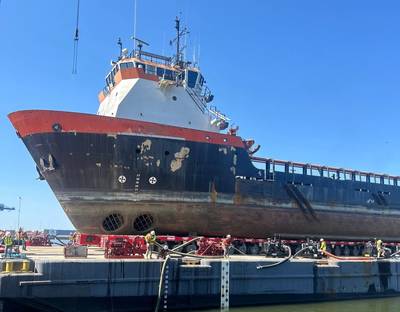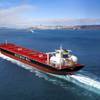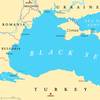OSVs Gain New Life
Faced with an aging fleet, the Woods Hole, Martha’s Vineyard and Nantucket Steamship Authority has turned to converted offshore support vessels (OSV) to breathe new life into its ferry operations.
The operator announced its purchase of the OSVs HOS Shooting Star and HOS Lode Star from Hornbeck Offshore Services in 2022, to replace its open-deck freight vessels Gay Head and Katama, and several months later, the operator exercised an option to acquire a third OSV, HOS North Star, to replace its vessel Sankaty.
A study commissioned by the Steamship Authority identified the existing freight vessels as having an expected useful life of less than five years, while the newly purchased OSVs have an estimated remaining useful life of at least 25 years.
Initial cost estimates for the acquisition, conversion and re-activation of the first two OSVs is approximately $30 million, the Steamship Authority said when it announced the deal. The third OSV purchase was made possible through an agreement with the Cape Cod Regional Transit Authority (CCRTA) yielding $28.1 million in additional federal funding becoming available to the Authority.
“The purchase and conversion of available OSVs is the most efficient, rapid and cost-effective path to upgrade our fleet and best serve the vehicle and freight transport needs of island residents and visitors,” Steamship Authority general manager Robert B. Davis said in a statement back in 2022. “The similar design of the vessels also promotes economies of scale through interchangability of vessels for service needs, inventory of spare parts and crew training.”
The Steamship Authority is already familiar with the OSV conversion model. Gay Head, Katama and Sankaty, like the three sister vessels that are being converted to replace them, came to the U.S. Northeast following previous lives as OSVs supporting the offshore oil and gas industry in the U.S. Gulf of Mexico.
The first two of the current conversions are nearing the finish line at Alabama Shipyard and will soon be delivered to their new owner under the names Aquinnah and Monomoy. The third OSV, to be renamed Barnstable, entered the yard in August to officially commence its planned 11-month conversion journey.
Built by Atlantic Marine, Inc. in Jacksonville, Fla. in 2008, the vessel is 240 feet long and 54 feet wide in its current state, offering a substantial platform for its new role as a passenger and freight ferry, said Ryan Schnoor, senior project manager at Alabama Shipyard.
“Its original design and ample deck space are ideal for its conversion into a ferry,” Schnoor said. “The existing infrastructure provides a solid foundation for modification and the vessel's flat aft deck makes it suitable to accommodate a range of vehicles and passengers.”
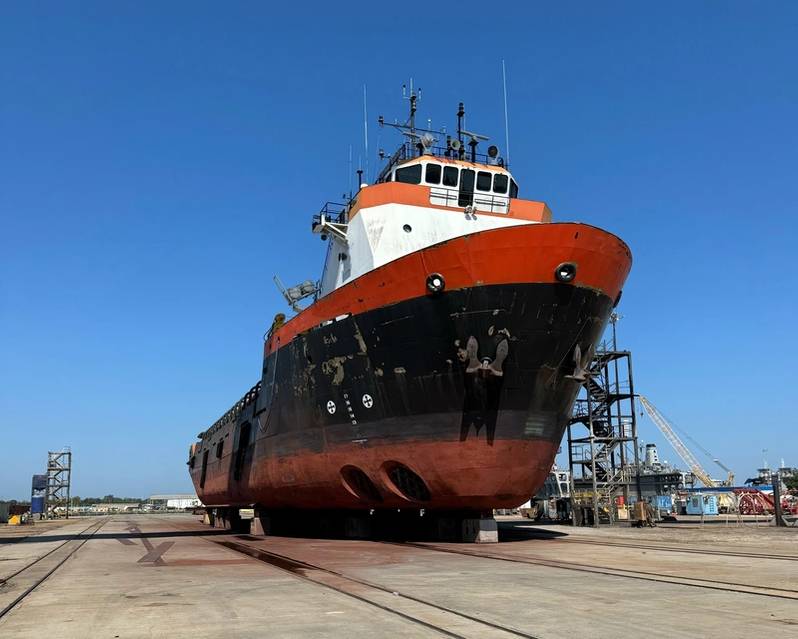 Alabama Shipyard, in Mobile, is a full-service ship repair facility serving both commercial and government customers. The yard features a 787- by 164-foot floating dry-dock, DD Alabama—one of the largest in the U.S.—and five pier locations to accommodate vessels up to 1,000 feet in length. (Photo: Alabama Shipyard)
Alabama Shipyard, in Mobile, is a full-service ship repair facility serving both commercial and government customers. The yard features a 787- by 164-foot floating dry-dock, DD Alabama—one of the largest in the U.S.—and five pier locations to accommodate vessels up to 1,000 feet in length. (Photo: Alabama Shipyard)
Upon arrival to Alabama Shipyard in August, the OSV was transferred to land, enabling initial work to begin.
“The vessel will undergo significant modifications, starting with the removal of a 24-foot midbody section to shorten its length,” Schnoor said. “It will then be lengthened with the addition of a stern deck extension to align with existing ferry landings.”
The result will be a vessel that is about 14 feet longer and 10 feet wider; its final dimensions will be 245 feet in length and 64 feet in breadth. The vessel will also be fitted with deck sponsons on both port and starboard sides for the accommodation of seven lanes of vehicles, and its public lounge area will be redesigned to include restrooms and seating for passengers.
Schnoor added that the propulsion and steering systems will be thoroughly overhauled, and the controls, navigation and emergency equipment will be upgraded to meet current regulations.
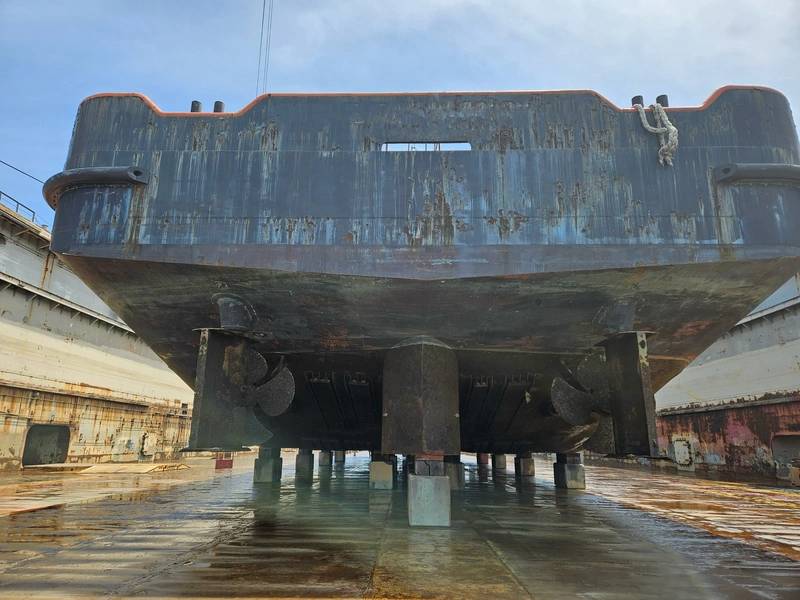 The Woods Hole, Martha’s Vineyard and Nantucket Steamship Authority has served as the transportation lifeline to the islands of Nantucket and Martha’s Vineyard year-round since 1960, and today is the largest ferry service to the islands. It transported more than 2.9 million passengers and more than 690,000 vehicles to and from the islands in 2023. (Photo: Alabama Shipyard)
The Woods Hole, Martha’s Vineyard and Nantucket Steamship Authority has served as the transportation lifeline to the islands of Nantucket and Martha’s Vineyard year-round since 1960, and today is the largest ferry service to the islands. It transported more than 2.9 million passengers and more than 690,000 vehicles to and from the islands in 2023. (Photo: Alabama Shipyard)
After all structural modifications are complete, the vessel will be relaunched and final outfitting and through testing will begin ahead of final delivery in the second half of 2025.
“The challenges of this project are primarily related to the complex coordination that is required for the various modifications. Sequencing the structural, electrical, piping and outfitting changes in a precise order to ensure the vessel meets the customer’s requirements is a key challenge,” Schnoor said.
“Another challenge is the confined working environments within the vessel,” he added. “Much of the work takes place in tight spaces, where only a limited number of personnel can operate simultaneously.”
To overcome these challenges, Alabama Shipyard is employing detailed planning and coordination strategies, Schnoor explained. “This includes developing a comprehensive project schedule that sequences each project phase and ensure that resources are allocated properly.”
“Alabama Shipyard’s ongoing conversion projects underscore how traditional maritime practices can be adapted to meet contemporary needs,” Schnoor said. “By successfully transforming OSVs into ferries, the shipyard has demonstrated its expertise, adaptability and proficiency at repurposing vessels for new roles.”



